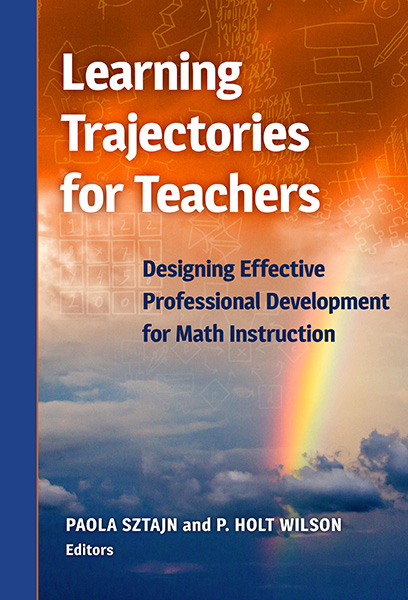Professors: Request an Exam Copy
Print copies available for US orders only. For orders outside the US, see our international distributors.
Edited by: Paola Sztajn, P. Holt Wilson
Publication Date: June 7, 2019
Pages: 176

Designed to strengthen the teaching of mathematics in the elementary grades, this book focuses on helping teachers engage in instruction based on learning trajectories (LTs). The authors bring together the experiences and key research-based findings of four different groups of teacher educators that created effective professional development around LTs. Beginning with a brief introduction to the key principles of LTs, the text then examines four exemplary projects with details on professional development design, teacher learning, and project implementation. The book features contributions from renowned scholars, including a final discussion and commentary chapter by professional development researcher Hilda Borko.
Book Features:
Paola Sztajn is associate dean for research and innovation and professor of mathematics education at the College of Education, North Carolina State University. P. Holt Wilson is an associate professor of mathematics education at the University of North Carolina at Greensboro.
“This is an amazingly important and valuable resource for mathematics teachers and leaders at any level. It provides the background and understandings so critical for teachers and teacher leaders to regularly consider and use learning trajectories to inform teacher planning and instruction. The research-based professional development projects shared validate both the importance and utility of learning trajectories.”
—Dr. Francis (Skip) Fennell, professor emeritus, McDaniel College, and past president of the Association of Mathematics Teacher Educators and the National Council of Teachers of Mathematics
“Many professionals are quick to claim that student thinking is at the core of good mathematics instruction. This is the first book that I’ve come across that unpacks what it means to have a framework for student learning at the center of one’s instruction. The authors show how the effect of teachers’ content knowledge and goals for student learning can be enhanced when accompanied by a map of how students come to know and understand the target understandings. But the book doesn’t stop there; it goes on to illustrate how student learning trajectories can be used as an instructional tool for teachers and professional developers. Both groups will benefit greatly from these visions of instruction and professional development that are tightly interwoven with research-based frameworks for student learning.” —Mary Kay Stein, University of Pittsburgh School of Education
“Learning Trajectories for Teachers uses four projects to unpack learning trajectories for professional development. These projects provide a framework for understanding and unpack high-quality mathematics instruction. I find this book useful for mathematics educators interested in framing learning trajectories across several domains—including tasks, discourse, curriculum, learners’ understanding, and assessment—to support professional development. Learning trajectories help us make connections among the domains and deepens professional knowledge and understanding.” —Robert Q. Berry III, professor, University of Virginia, and president of the National Council of Teachers of Mathematics
Contents
Acknowledgments vii
1. Learning Trajectories and Professional Development 1
Paola Sztajn and P. Holt Wilson
2. The Learning Trajectory Based Instruction Project 15
Paola Sztajn, Cyndi Edgington, P. Holt Wilson, Jared Webb, and Marrielle Myers
3. The Children’s Measurement Project 48
Jeffrey E. Barrett, Megan H. Wickstrom, Jennifer M. Tobias, Craig J. Cullen, Amanda L. Cullen, and Jae M. Baek
4. The Responsive Teaching in Elementary Mathematics Project 75
Victoria R. Jacobs, Susan B. Empson, D’Anna Pynes, Amy Hewitt, Naomi Jessup, and Gladys Krause
5. The Building Blocks and TRIAD Projects 104
Julie Sarama and Douglas H. Clements
6. Design Considerations for Professional Development Involving Learning Trajectories 132
P. Holt Wilson and Paola Sztajn
7. Learning Trajectories in Mathematics Professional Development: A Commentary 141
Hilda Borko
About the Contributors 155
Index 159
Professors: Request an Exam Copy
Print copies available for US orders only. For orders outside the US, see our international distributors.